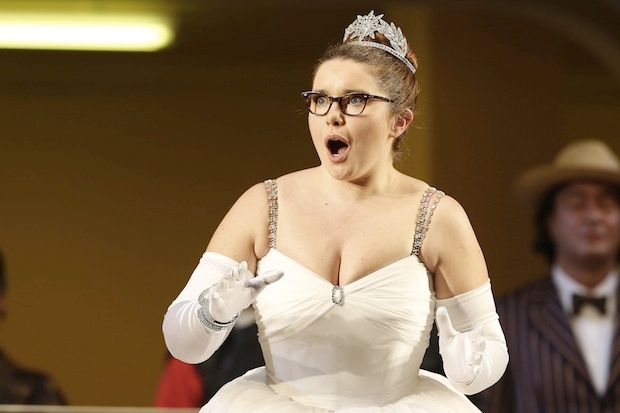London’s opera critics have been roundly condemned for suggesting that a female singer’s personal appearance could make her unsuitable for a role. The singer in question is Tara Erraught, a young Irish mezzo-soprano based in Germany, who has just made her British debut in the new Glyndebourne production of Richard Strauss’s Der Rosenkavalier. She takes the part of Octavian, who, although always played by a woman, is supposed in the plot to be an irresistibly attractive young man. The critics all admired Erraught’s voice, but took the view that she was too stocky, dumpy, chubby and unsightly (to use four of their adjectives) to be even remotely plausible as an object of sexual desire.
Uproar followed, with other opera singers leaping to her defence. They accused the critics of cruelty to a vulnerable young woman at the start of her career and of regarding her appearance as more important than her voice. ‘How, then, have we arrived at a point where opera is no longer about singing but about the physiques and looks of the singers, specifically the female singers?’ asked the mezzo-soprano Jennifer Johnston on the Guardian’s website. Dame Kiri Te Kanawa felt strongly enough to take a call in New Zealand from the Today programme in which she blamed any perceived shortcomings in Erraught’s appearance on the ridiculous costumes she was made to wear.
The impression given in the media reports of this affair has been of an opera world united in disgust at the critics’ cheap obsession with a singer’s appearance when all that really mattered in opera was the singing. But already ten years ago it was made clear that even a great opera house could care as much about a singer’s physique as about her voice when Covent Garden sacked the American soprano Deborah Voigt, who had been due to sing the title role in another Strauss opera, Ariadne auf Naxos, although she was considered perhaps the world’s best interpreter of the part. But she weighed somewhere between 15 and 20 stone, and she was sacked because she couldn’t get into the little black dress that this particular production had required her to wear.
Attacked by the opera critic of the New York Times, who wrote that the Royal Opera House had apparently forgotten ‘the most basic truth’ that ‘opera has never been dependent on literal reality’ and that ‘great music and great voices take you to the core of the drama and the essence of the characters’, the opera house begged to differ. It said in a press statement: ‘Any production is a fusion of elements: musical, dramatic and visual. And any opera casting means assessing both the vocal and dramatic suitability for a certain role and certain production concept. That is fundamental to the art form.’
Its message was very clear. In the past, fatness might not have mattered. You could look like an elephant, but still play a consumptive, teenage, lovesick heroine on stage and earn a standing ovation if you could sing well enough. But those days were over, it implied: audiences now demanded some degree of visual reality. This was why Deborah Voigt had to suffer her humiliation, and also why she subsequently underwent gastric bypass surgery, lost seven stone, and returned triumphantly to the Covent Garden stage. So ten years after this memorable event, it is surprising that opera critics should find themselves under attack for upholding the principle of ‘dramatic suitability’ to which the Royal Opera House then pronounced itself committed in its casting policy.
I should point out that in her photographs Tara Erraught looks plump rather than in any way obese and actually rather pretty; but there are still a number of very fat opera singers who seek to perpetuate the idea that you need to be fat in order to sing well, though there is no scientific evidence to support this belief. At the time of the Voigt sacking, Peter Katona, the casting director of the Royal Opera House, was quoted in a Sunday newspaper as saying that opera singers often used the myth that fat people had more powerful voices as an ‘excuse’ to eat too much. ‘They say, “In order to be able to sing well, I need to eat a lot,”’ he claimed. If he is right, it is time that opera singers stopped rejoicing in their fatness and joined with the rest of mankind in the great battle against obesity.






Comments